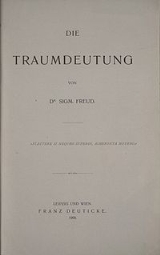
The Interpretation of Dreams
Overview
The Interpretation of Dreams is a book by psychoanalyst Sigmund Freud
. The first edition begins:
.
The book introduces Freud's theory of the unconscious
with respect to dream interpretation
. Dream
s, in Freud's view, were all forms of "wish fulfillment
" — attempts by the unconscious to resolve a conflict of some sort, whether something recent or something from the recesses of the past (later in Beyond the Pleasure Principle
, Freud would discuss dreams which did not appear to be wish-fulfillment).
Sigmund Freud
Sigmund Freud , born Sigismund Schlomo Freud , was an Austrian neurologist who founded the discipline of psychoanalysis...
. The first edition begins:
.
The book introduces Freud's theory of the unconscious
Unconscious mind
The unconscious mind is a term coined by the 18th century German romantic philosopher Friedrich Schelling and later introduced into English by the poet and essayist Samuel Taylor Coleridge...
with respect to dream interpretation
Dream interpretation
Dream interpretation is the process of assigning meaning to dreams. In many ancient societies, such as those of Egypt and Greece, dreaming was considered a supernatural communication or a means of divine intervention, whose message could be unravelled by people with certain powers...
. Dream
Dream
Dreams are successions of images, ideas, emotions, and sensations that occur involuntarily in the mind during certain stages of sleep. The content and purpose of dreams are not definitively understood, though they have been a topic of scientific speculation, philosophical intrigue and religious...
s, in Freud's view, were all forms of "wish fulfillment
Wish fulfillment
Wish fulfillment in psychology is the satisfaction of a desire through such involuntary thought processes such as dreams, daydreams, an neurotic symptoms. In Freudian psychoanalysis, it is when desires of the unconscious are unacceptable to the ego and superego because of feeling of guilt or...
" — attempts by the unconscious to resolve a conflict of some sort, whether something recent or something from the recesses of the past (later in Beyond the Pleasure Principle
Beyond the Pleasure Principle
"Beyond the Pleasure Principle" is an essay by Sigmund Freud. It marked a turning point and a major modification of his previous theoretical approach. Before this essay, Freud was understood to have placed the sexual instinct, Eros, or the libido, centre stage, in explaining the forces which drive...
, Freud would discuss dreams which did not appear to be wish-fulfillment).

